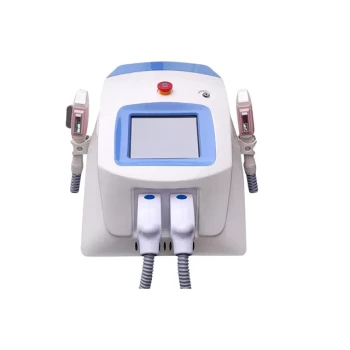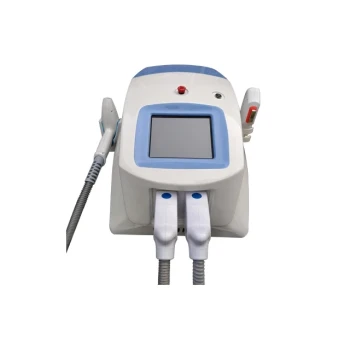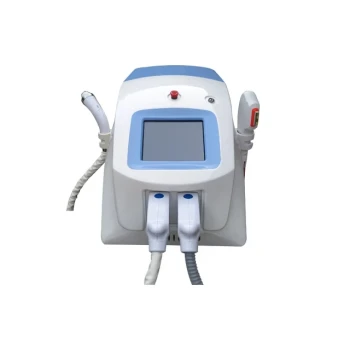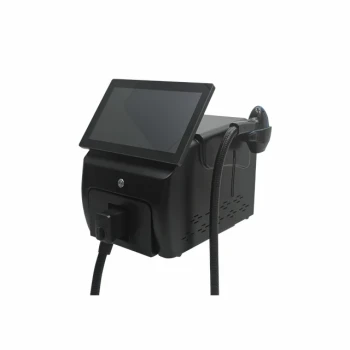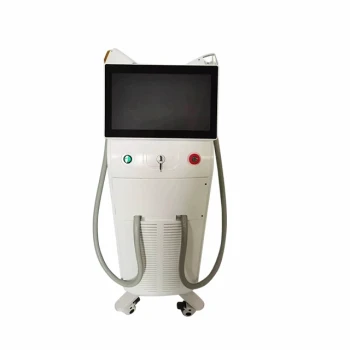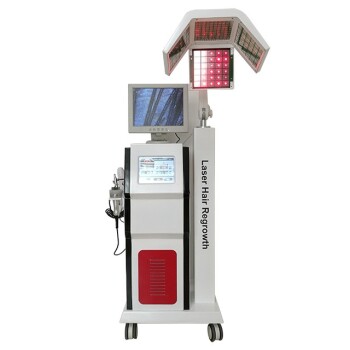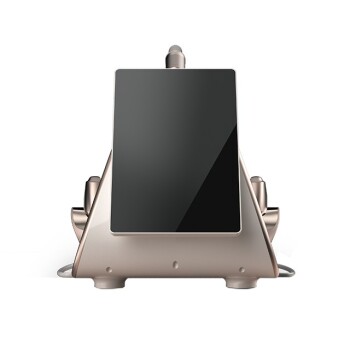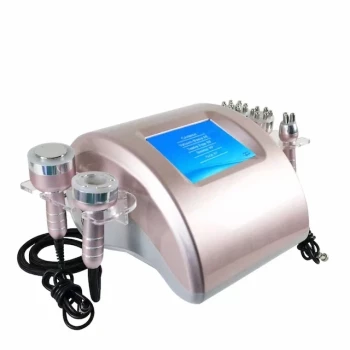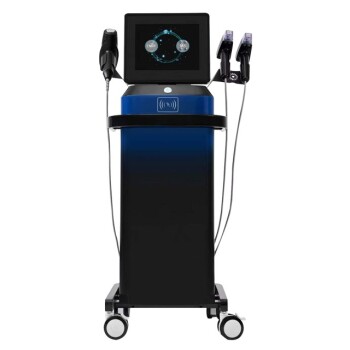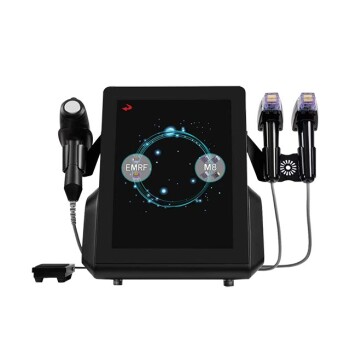In short, Intense Pulsed Light (IPL) is not suitable for everyone. It should be avoided by individuals with dark skin tones, very light or red hair, those who are pregnant, and people taking certain photosensitizing medications or with specific skin conditions. The safety and effectiveness of the treatment hinge on a clear contrast between your skin and the pigment you are targeting.
The core principle of IPL is targeting melanin with light and heat. If your skin has high levels of melanin (as in darker or tanned skin), the device cannot distinguish it from the target hair or dark spot, creating a significant risk of burns, discoloration, and scarring.
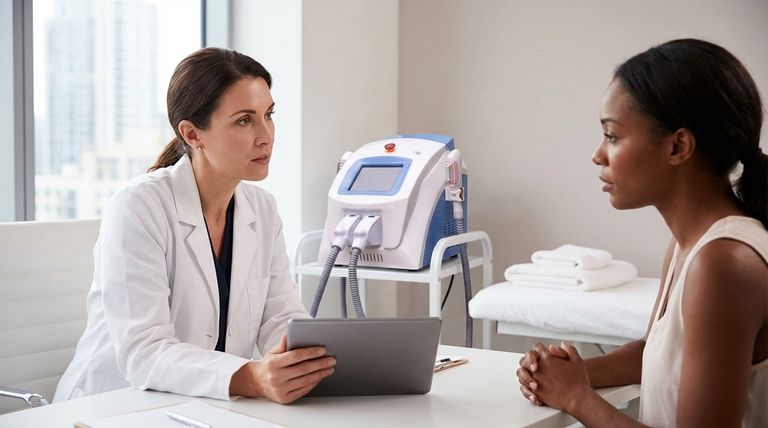
The Fundamental Principle: Why Contrast Is Key
The limitations of IPL are not arbitrary; they are based on the physics of how the technology works. Understanding this principle is the first step toward determining if it's right for you.
How IPL Works: Targeting Melanin
IPL devices emit a broad spectrum of light that is filtered to target a specific color, or chromophore. For hair removal or treating dark spots, that target is melanin, the pigment that gives skin and hair its color.
The light energy is absorbed by the melanin and converted into heat, which damages the hair follicle or breaks up the unwanted pigment. For the treatment to be both safe and effective, the light must be absorbed by the target, not the surrounding skin.
The Risk of Low Contrast
This is where problems arise. If the surrounding skin has a high concentration of melanin (as in darker skin tones, classified as Fitzpatrick types V and VI), it will also absorb the light energy.
The device cannot differentiate between the melanin in a hair follicle and the melanin in the skin. This absorption by non-target skin can lead to burns, blisters, permanent hyperpigmentation (darkening), or hypopigmentation (lightening).
Absolute Contraindications: When to Avoid IPL Entirely
For the following groups, the risks of IPL generally outweigh any potential benefits. A professional consultation is mandatory, but in most cases, an alternative treatment will be recommended.
Dark Skin Tones and Light Hair Color
Individuals with very dark skin (Fitzpatrick scale V-VI) are not suitable candidates due to the high risk of skin burns.
Conversely, IPL is ineffective on very light hair (blonde, red, or grey) because it lacks the melanin needed to absorb the light energy.
Pregnancy and Breastfeeding
While there is no direct evidence that IPL harms a fetus, no safety studies have been conducted. Due to this lack of data, the procedure is considered an absolute contraindication during pregnancy and is typically avoided during breastfeeding as a precaution.
Active Skin Conditions or Infections
You should not perform IPL over areas with active eczema, psoriasis, rosacea, or open sores. Likewise, an active herpes simplex (cold sore) outbreak is a contraindication, as the heat can trigger a worse or more widespread infection.
History of Keloid Scarring
Keloid scarring is the formation of excessive scar tissue beyond the boundary of the original injury. Because IPL works by creating a controlled thermal injury in the skin, it can trigger keloid formation in susceptible individuals.
Use of Photosensitizing Medications
Many common medications dramatically increase the skin's sensitivity to light. Performing IPL on someone taking these drugs can cause severe burns.
The most critical medication is isotretinoin (Accutane); you must wait at least six months after your last dose. Other photosensitizers include tetracycline antibiotics, certain diuretics, and topical retinoids like tretinoin (though a shorter washout period may be sufficient for topicals).
Specific Medical Conditions
Conditions that involve photosensitivity, such as lupus or porphyria, make IPL unsafe. Additionally, a personal history of skin cancer, including melanoma or basal cell carcinoma, in the desired treatment area is a strict contraindication.
Understanding the Common Pitfalls
Beyond absolute contraindications, several common situations require extreme caution or make you a temporarily unsuitable candidate.
Tanned Skin: A Temporary Risk
Any form of tan—from the sun, a tanning bed, or even self-tanning lotion—darkens your skin by increasing its melanin content. This temporarily removes the necessary contrast for a safe treatment and puts you at the same risk as someone with a naturally darker skin type. Most clinics require you to be free of any tan for at least four weeks before a session.
Tattoos and Dark Moles
IPL should never be performed over a tattoo. The device will target the dark ink pigment as if it were melanin, resulting in a painful burn, blistering, and permanent distortion of the tattoo. Similarly, dark moles should be covered or carefully avoided during treatment.
The Challenge of Hormonal Pigmentation (Melasma)
While IPL is often used for sun spots, its use on melasma is highly controversial. Melasma is a complex form of pigmentation often triggered by hormones and heat. The heat generated by an IPL device can sometimes paradoxically make melasma worse, a phenomenon known as post-inflammatory hyperpigmentation.
Making a Safe and Informed Decision
Your safety is the highest priority. Evaluating your candidacy is not a step to be skipped, and a consultation with a board-certified dermatologist or a highly experienced, certified technician is non-negotiable.
- If your primary focus is hair removal on dark skin: Explore alternatives like an Nd:YAG laser, which operates at a longer wavelength that is safer for darker skin tones.
- If your primary focus is removing light-colored hair: IPL will be ineffective, so you should consider electrolysis, which targets the follicle directly regardless of hair color.
- If you are taking any medication or have a health condition: You must disclose your full medical history to your provider to ensure a safe procedure.
- If you are unsure about your skin type or a specific spot: Seek a professional medical opinion before considering any light-based treatment.
Ultimately, understanding the limitations of IPL is just as important as understanding its benefits, empowering you to choose a path that is both safe and effective for your goals.
Summary Table:
| Contraindication | Reason |
|---|---|
| Dark Skin Tones (Fitzpatrick V-VI) | High risk of burns due to melanin absorption |
| Light/Red Hair | Lack of melanin makes treatment ineffective |
| Pregnancy/Breastfeeding | Lack of safety data; precautionary avoidance |
| Active Skin Conditions (e.g., eczema, herpes) | Risk of worsening infection or inflammation |
| Photosensitizing Medications (e.g., Accutane) | Increased risk of severe burns |
| History of Keloid Scarring | May trigger excessive scar formation |
| Tanned Skin | Temporary increase in melanin raises burn risk |
| Tattoos/Dark Moles | Targets ink pigment, causing burns and damage |
Ensure Your Safety with Professional Guidance from BELIS
Unsure if IPL is right for you? BELIS specializes in providing medical aesthetic clinics and premium beauty salons with advanced, safe, and effective equipment. Our experts can help you choose the right technology for your skin type and goals. Contact us today for a personalized consultation and discover how our professional-grade devices minimize risks while maximizing results.
Visual Guide
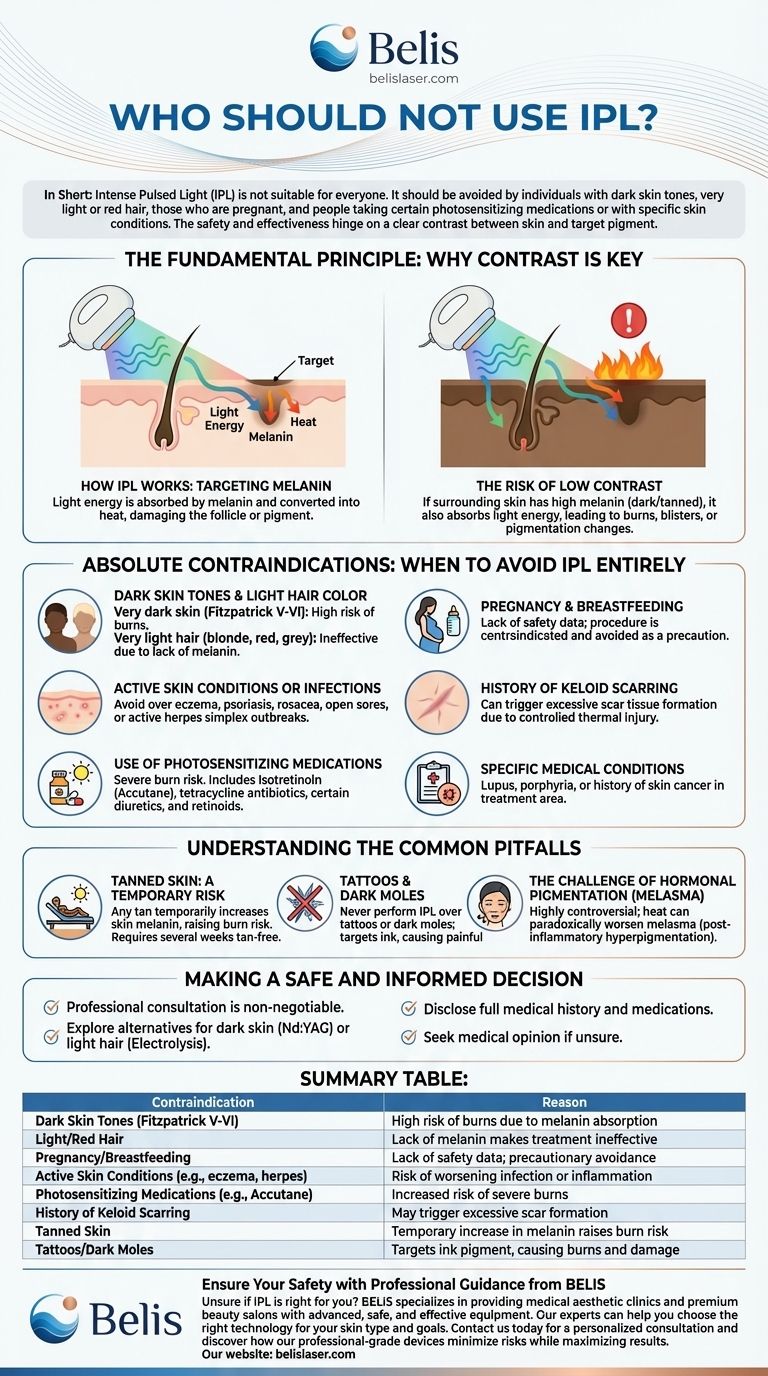
Related Products
- IPL SHR Hair Removal Machine for Permanent Hair Removal
- Clinic Use IPL and SHR Hair Removal Machine with Nd Yag Laser Tattoo Removal
- Clinic Use IPL SHR ND YAG Laser Hair Removal RF Skin Tightening Machine
- IPL SHR+Radio frecuency machine
- Clinic Diode Laser Hair Removal Machine with SHR and Trilaser Technology
People Also Ask
- What is intense pulsed light good for? A Versatile Solution for Sun Spots, Redness, and Hair
- How quickly do you see IPL results? A Realistic Timeline for Clearer Skin
- Does IPL hair removal actually work? Achieve Long-Term Hair Reduction
- What are the negative effects of IPL? Understanding Risks for Safe Treatment
- Can IPL be used on all skin types? Understanding Risks for Darker Skin Tones
